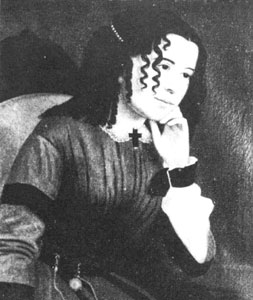
Elizabeth Avery Meriwether
Tennessee suffragist, temperance activist, publisher, and author Elizabeth Avery Meriwether was born in Bolivar on January 19, 1824. Her father Nathan Avery was a physician and farmer, while her mother Rebecca Rivers Avery was the daughter of a Virginia planter.
Financial problems led the family to move to Memphis around 1835. Nathan’s death in 1846, and Rebecca’s in 1847, caused an economic crisis for the siblings. Brother Tom sought outside employment to support his four sisters, and Elizabeth operated a school for some twenty-five students in the family’s dining room.
In 1852 she married Minor Meriwether, a railroad civil engineer. Carrying out the wishes of Minor’s late father, the couple sold part of Minor’s inherited land to free his slaves and repatriate them to Liberia. She characterized the act as abolitionist, although she later accepted the gift of a household slave from her brother. Both Meriwethers spoke of their marriage as strong and happy. Elizabeth bore three sons: Avery, in 1857; Rivers, in 1859; and Lee (the namesake of General Robert E. Lee), in 1862.
With the onset of the Civil War Minor Meriwether joined the officer corps of the Confederate army. He served with General Nathan Bedford Forrest; Elizabeth was vocal in advocacy of the Confederate cause, and defiant during Union occupation. General William T. Sherman ordered her to leave Memphis in December 1862, weeks before the birth of her third son. She recounted the experience in her 1863 short story, “The Refugee.”
After the war Minor Meriwether purchased a modest Memphis home for his family on the current site of the Peabody Hotel. He worked with Nathan Bedford Forrest to establish the Ku Klux Klan in Memphis; an early Klan organizational meeting took place in Elizabeth’s kitchen.
Elizabeth Meriwether nettled occupation forces to reinstate the title to her girlhood home, successfully arguing that her 1851 “abolitionist” stand invalidated its seizure. Thus recognized as a property owner and tax payer, she obtained a voter registration in 1872.
She published a small-circulation newspaper, The Tablet, during part of 1872. It featured her unorthodox views on woman suffrage, divorce law, and pay equity for women teachers. In 1876 she made one of the first public suffragist addresses in Memphis. Elizabeth and her sister-in-law Lide Meriwether championed a number of reform causes. Both were active in the Woman’s Christian Temperance Union and belonged to the National Woman Suffrage Association. Elizabeth served as a national officer of NAWSA in 1886. She presented unsuccessful suffrage petitions at both the Democratic and Republican national conventions in 1880.
Elizabeth Meriwether’s published writing includes two novels, The Master of Red Leaf (1872) and Black and White (1883), and a play, The Ku Klux Klan, or The Carpetbagger in New Orleans (1877). Nonfiction works include Facts and Falsehoods About the War on the South (1904), published under the pseudonym George Edmonds, and The Sowing of the Swords, or The Soul of the ‘Sixties (1910). An informal memoir, Recollections of 92 Years, was serialized in many Tennessee papers in 1916 and was published by her son Lee in 1958. Meriwether’s writing idealized the Confederate cause and the traditional race ideology of the “Old South.”
Elizabeth Meriwether died in St. Louis on November 4, 1916; several months earlier, each of the major political parties had adopted campaign planks urging passage of a woman suffrage amendment.
Suggested Reading
Elizabeth Avery Meriwether, Recollections of 92 Years, 1824-1916 (1958); Marsha Wedell, Elite Women and the Reform Impulse in Memphis, 1875-1915 (1992)



